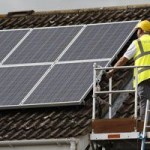 Energy-efficiency specialist Eaga has secured £300m from a number of banks to fund plans to install photovoltaic panels on more than 30,000 UK homes.
Energy-efficiency specialist Eaga has secured £300m from a number of banks to fund plans to install photovoltaic panels on more than 30,000 UK homes.
The money comprises £75m in equity and £225m in debt financing, drawn from a syndicate involving HSBC, Lloyds, National Australia Bank Limited, RBS and Santander.
The equity funding will be invested by Eaga, HSBC Environmental Infrastructure Fund and Barclays European Infrastructure Fund II in a newly created Special Purpose Vehicle (SPV) company.
“The pathfinder nature of the project has meant that it has taken longer than we expected to get to this stage, during which time we have had to carry significant costs to maintain our installation capability,” said Eaga chief executive Drew Johnson. “But we are now uniquely positioned with both the financial resources and the operational capability to capitalise on this significant market opportunity.”
Eaga is expected to be taken over by homebuilder Carillion in a £300m deal later this year, and said the prospective owners had approved the funding and were supportive of the project.
To date, the company claims to have installed more than 1,000 photovoltaic panels systems across the UK, which it said would be transferred to the SPV “in due course”.
The new scheme is likely to see photovoltaic panels installed for free on social housing projects, allowing residents to take advantage of the resulting energy while the company receives the payments generated through the government’s feed-in tariff incentives.
The news will come as a boost to the government’s solar energy plans following its controversial decision to launch an early review of the level of incentives available through the feed-in tariff scheme to larger solar photovoltaic panels with over 50kW capacity.
Solar farm developers have warned the move will undermine investor confidence and make larger solar photovoltaic panels financially unviable. But ministers have argued that it is necessary to reduce the level of support for larger solar photovoltaic panels in order to ensure incentives remain available for the domestic rooftop installations proposed by companies such as Eaga.



